This section is for paid subscribers only. Our subscription is only $3700/- for one full year.
You get unlimited access to all paid section and features on the website with this subscription.
Subscribe to read full article
This section is for paid subscribers only. Our subscription is only $37/- for one full year.
You get unlimited access to all paid section and features on the website with this subscription.
Not ready for a full subscription?
You can access this article for $2, and have it saved to your account for one year.
- LanguageHindi
Drifting the sea of life, singing in the melas, dancing in the bazaars was Bhulwa, a young urchin, pleasantly naughty but highly sentimental, earning his few annas a day in mela theatricals. A suburb of Calcutta is agog with excitement with the presence of a touring theatrical in the midst of its semi village quietude. Bhulwa as usual plays his pranks, arouses the ire of the Manager, gets a box on his ears, a punch on his nose and a kick in his hind parts, his self-respect hurt, he runs as fast as his small legs can carry him, clings on the ladder of a speeding fire engine and escapes the fury of his persecutor. The fire engine rushes to extinguish the flames that engulf an orphanage. Bhulwa is an astonished on-looker. Little orphans are being saved, one of them, a sweet little mute runs away from her tormentor, here again the manager and literally bumps into Bhulwa. Bhulwa, ever sympathetic with ones smaller than himself, pities the girl and together they run away from the scene of confusion and turmoil. Safe in the peacefulness of a nearby groove, Bhulwa tries to impress upon his ward his greatness and confides in her, his ambitions of appearing on the stage of the big theatres of Calcutta. He speaks enthusiastically of the footlights and the limelight. He assures her that he will teach her to sing and dance and together they will win fame and fortune. His enthusiasm waxes and his eloquence takes them deeper into the night, when the cold wind rudely reminds him of his poverty and the scantiness of Monju's clothing. Bravely, Bhulwa doffs his shirt and wraps it round the shivering Monju and spying some boats. Taking advantage of the high tide, the boatmen push off, unaware of the stowaways, and the morning sees them in a distant village.
Bhulwa and Monju, thrown together by circumstances, develop a strong attachment, singing, dancing, begging, growing up together. They grow and Bhulwa's desire to join the theatre grows. They carefully save the alms they collect from village to village. They buy a harmonium and set out for Calcutta, to attain Bhulwa's long-cherished desire and ambition, with great hopes. But Dame Fate is peculiar, and her eccentricities still more peculiar.
Bhlihva's hopes are shattered. Monju entreats Bhulwa to return to the village. She speaks of the peace of village life. Bbulwa does not agree. His desire is unquenchable.
Singing on the streets for alms, the golden voice of Monju attracts the attention of Amarchand, the Actor-Manager of the Diamond Theatre. This profligate, as he is, orders a servant to call the street singer in. Amarchand is astonished to see such a beautiful face matching the golden voice, and to think that they are being wasted on the streets. He gives them a five rupee note and promises Monju a job on the stage, and holds out a promise to Bhulwa as well.
Brooding over his losses, pondering over the possibilities of a revival of business if a beautiful girl is found, sat Trilokenath, the proprietor of the Diamond Theatre, worried and perplexed. Amarchand rushes in with the good news. Trilokenath and Amarchand go to Monjn. Monju's job is confirmed. Promises are held out to Bhulwa. Monju gets her theatrical songs tuned by Bhulwa and is trained by him. Events change fast. Amarchand has fallen in love with Monju. This love has changed Amarchand. He has got rid of his vices. He tries to serve Monju. Tirlokenath tries to seduce Monju. Amarchand saves her. Amarchand explains to Monju that there is dirt and uncleanliness in all walks of life but one can live cleanly in any walk of life.
The premiere. Monju's debut. Stage fright. Amarchand encourages Monju. Monju appeals to Bhulwa. Bhulwa comforts her. Amarchand gives a bouquet to Monju, Monju gives it to Bhulwa. Bhulwa whispers soft words of encouragement. Monju enters. Her eyes on Bhulwa, she greets the audience. The audience greets her. Monju's debut is successful.
She is acclaimed. The Diamond Theatre prospers. Though successful, Monju does not like the city life. Bhulwa, still hoping for a chance for himself, persuades her to stay on.
He infuses her with spirit. The evolution of Monju begins. Modern furniture, modern dresses, modern taste.
Swollen headed with fame, Monju is no longer a village girl. Monju rebukes a servant. Bhulwa is annoyed at her high-brow manner. He reminds her of her own days of poverty.
Monju does not like the reminder. She leaves for the theatre. Amarchand, in his desire to possess Monju, turns up a new leaf in life. He places himself and his all at Monju's disposal. Monju is pleased. She is carried away by Amarchand's attention and munificence. At times she forgets Bhulwa. Bhulwa feels this inattention. He bears it silently.
Amarchand keeps Bhulwa in hopes for a job.
One day the .Music Director requests Monju to learn the new tune of a song, Bhulwa's favourite song. Monju refuses to change the tune. The Music Director insists. Monju persists. They argue. Monju declines. Monju returns home. She does not find Bhulwa at home. She hears that Bhulwa has fever and has gone out. She cooks some light food for the sick.
Amarchand hears of Monju's refusal to work. He hurries to request her to return. "It is the opening night of the new play. They will be ruined." Amarchand pleads. A voice is heard on the radio. Monju is pleasantly surprised hearing Bhulwa's voice on the radio. At the same time Monju feels hurt because Bhulwa never told her about this engagement at the radio station. Amarchand entreats Monju to come back and sing the song, in the new tune. Monju declining, says it will pain Bhulwa if she changed the tune set by him, and then, suddenly, agrees to the new tune, just to spite Bhulwa. She believes Bhulwa ignored her when he took up the job at the radio station. To tease Bhulwa, further, she orders the servant to ask Bhulwa, on his return, to go to the theatre; calculating on his annoyance when be bears the new tune, not counting upon the grave consequences it may lead to. Bbulwa returns home soaked in rain. The fever has increased. The servant gives Monju's message. Bhulwa hurries to the theatre. The servant requests him to rest with his fever. Bhulwa says that Monju will be nervous without him. He must be near her. She will be encouraged. He goes.
The play has started. Monju nervously awaits Bhulwa. She looks for him in the audience. Bhulwa arrives. Monju sees him. She sings. Bhulwa is surprised. It is not the same tune. The Devis are insulted. He cannot bear it. He jumps on the stage. There is confusion. The curtain is dropped. Bhulwa is thrashed and turned out of the theatre. Monju is unaware of the treatment accorded to Bhulwa. On the contrary, she is highly strung and feels insulted at Bhulwa's behaviour in the presence of the big crowd. Monju tells Amarchand that she will never return to Bhulwa. Amarchand is inwardly delighted. Amarchand takes Monju to his house. Monju cannot sleep. She weeps and passes a sleepless night.
Bhulwa returns home. He picks up his old harmonium and speaks to it. "Monju is lost," he says, "let us find her." With an old costume of Monju and singing her favourite song on the faithful harmonium, Bhulwa sets out.
Monju comes home to tell Bhulwa that she will never see hi m again. She does not find Bhulwa. She is upset. Complaints and accusations fly to the winds. Remorse sets in.
Old love finds its place. Monju telephones to Amarchand to come quickly. Amarchand misunderstands. He hurries to her. Monju accompanies Amarchand in his car, her eyes searching for Bhulwa. Amarchand is happy. He thinks she is fleeing with him. Amarchand, with a hidden pride, reminds Monju that she is leaving fame and fortune behind.
Monju does not pay heed to his words. There is but one thought in her mind, one object in view. Her eyes scanning, her mind fixed, her heart going out to the one and only Bhulwa. Her one request to Amarchand is to go faster. At a fork in the road Monju requests Amarchand to go on the road on which Bhulwa •and she had travelled to the city.
"He must have gone on this road. Please hurry. Find him. .He is angry. I will lose him." These words bring the truth home to Amarchand. He realises.
A storm arisen.
The riverside is reached, Bhulwa's boat can be seen in the distance. Monju's favourite song can be faintly heard through the storm. Monju cries and shouts for Bhulwa. The storm increases. The boat is tossed about. Monju can still hear the faint music. She cries louder and louder. The storm rages stronger. The boat is dashed against the banks!
And then?
(From the official press booklet)
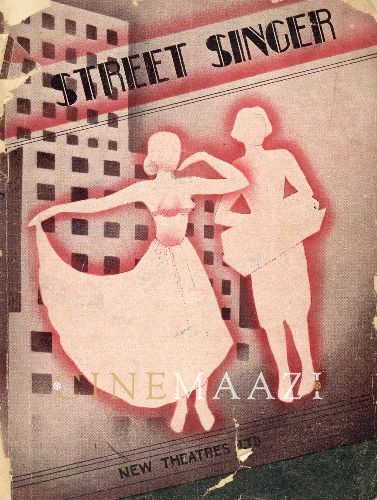
Cast
Crew
-
BannerNew Theatres, Calcutta
-
Director
-
Cinematography



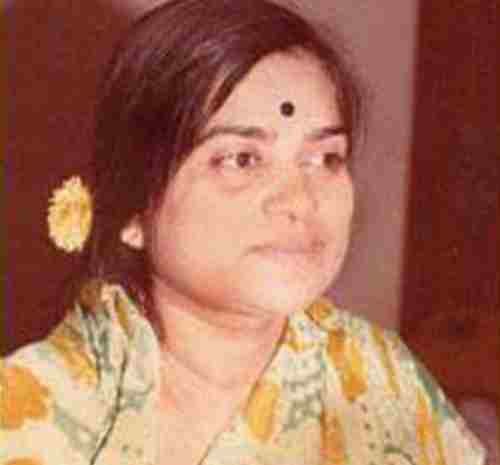
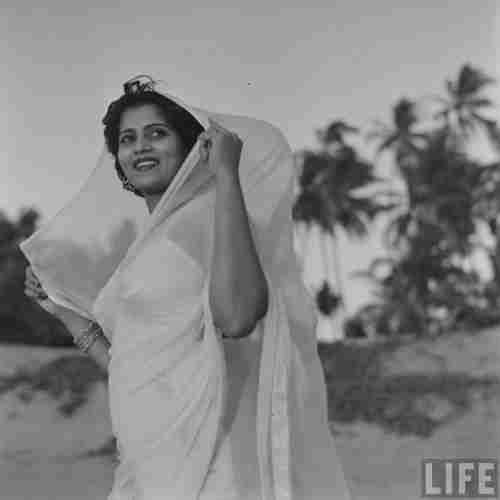

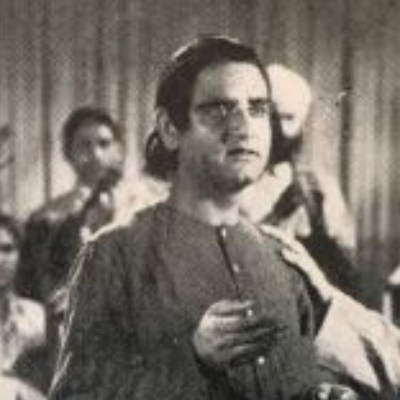
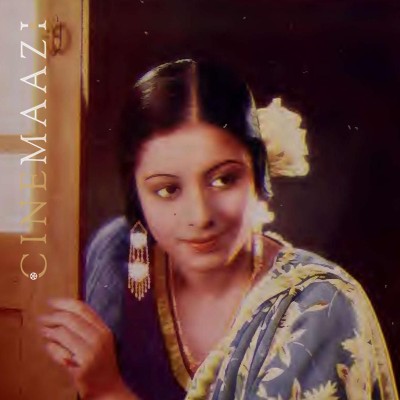
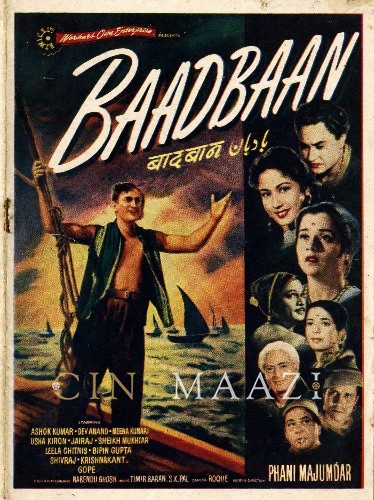
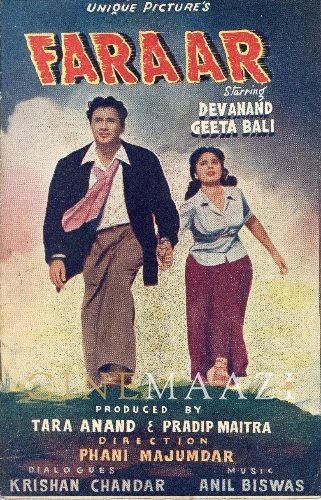
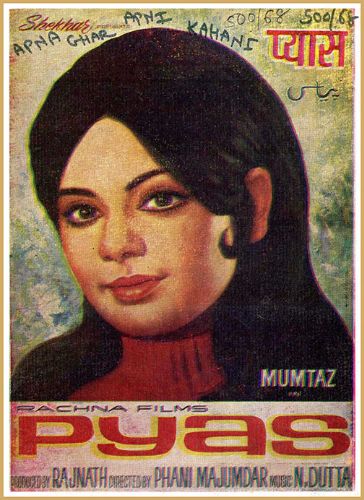

.jpg)



